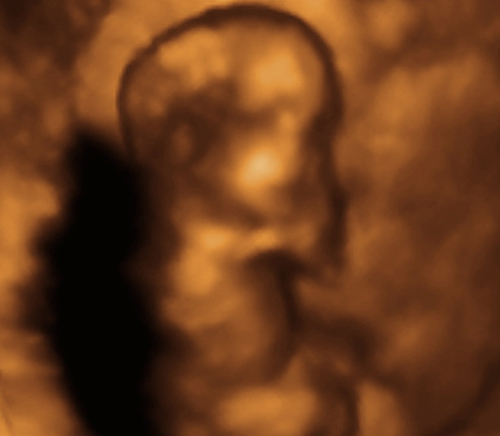You are 12 Weeks and 4 Days 192 days to go…
Complex brain development is gradually enabling your unborn baby to become more responsive and mobile.
Your baby today
By now the fetus’s forehead is high and bulging, with visible
joins in the plates of bone that comprise the skull. The eyes have
migrated from the sides of the head at this stage of development.

Your baby’s brain is under-going rapid development.
The right and left cerebral hemispheres begin to connect. Each
hemisphere controls the opposite side of the body, so the right side of
the brain controls muscles on the left side of the body and the left
side controls muscles on the right side of the body.
Motor fibers (those
that control movement) mature first, so your baby can make increasingly
complex limb movements. Sensory nerves (those that control feeding)
mature later and are first present on your baby’s hands and in his
mouth. The brain matures quickly over the next three weeks and will be
complete in around 10 weeks’ time, as the rest of the upper and lower
limbs and trunk achieve adult levels of sensitivity to stimuli. All your
baby’s nerves are very immature at this stage and he doesn’t have any
perception of position, pain, temperature, or touch.
… Nutrition
Yummy yogurt
For a calcium-packed snack,
stock up on yogurt. Those with so-called friendly bacteria are okay to
eat during pregnancy and may help your digestion. Just make sure that
the milk ingredients in your yogurts have been pasteurized to reduce the
risk of infection with listeria .
… Doctor
| Q: |
I’ve been diagnosed with diabetes. How will this affect my pregnancy?
|
| A: |
Whether you develop diabetes in pregnancy (known as
gestational diabetes), or have pre-existing diabetes, you will require
special care from a diabetic health-care team and a obstetrician. This
is because diabetes poses risks in pregnancy, particularly if there is
poor control of blood-glucose levels.
All this can be
managed with close prenatal care: your blood glucose needs to be well
controlled since your insulin requirements will increase during
pregnancy. You will also need to adapt your diet and may need insulin
injections.
Pregnant women who are diabetic are at a greater risk of high blood pressure, blood clots, and preeclampsia.
If you have diabetic kidney disease, and diabetic retinopathy, a
condition that affects the retina in the eye, there’s a chance it will
worsen during pregnancy. For your baby, there is an increased risk of
congenital abnormalities and growth may be too fast or too slow.
|
You are 12 Weeks and 5 Days 191 days to go…
You and your partner will be developing your own special relationship with your baby.
At this point in your
pregnancy, you won’t be able to feel your baby move but it is still
possible to interact and bond with him. Some women feel comfortable
talking to their babies, while others don’t; do what feels natural for
you, whether that is talking out loud or in your head.
Very soon, your baby will be able to hear and recognize your voice and that of your partner, and hear other
sounds, such as music. You might want to think of an interim name for
your baby. This might be “the bump” or “the bun” or an in-joke between
you and your partner. It can be helpful to give your baby an identity
because it’s difficult to talk about him or her at this relatively early
stage, and when you don’t know the gender.
If you’re still keeping
the pregnancy a secret in some quarters, using a code phrase to refer
to the pregnancy may be useful in some circumstances.
Activities to avoid in the second trimester
The second trimester is generally when fatigue lifts,
and you begin to feel more energetic. This is a great time to continue
your exercise program, making good use of your increased energy levels
before you are too big and too uncomfortable to move and enjoy being
fully active.
While you’re
encouraged to continue to exercise during the second trimester, there
are some high-risk exercises that should be avoided. You should avoid
any activity that potentially could cause you to fall, activities that
involve a high degree of balance and agility, and specifically exercises
that require lying on your back for extended periods, or twisting of
the upper body. Changes in your center of gravity can increase the
chances of stumbling and falling, risking injury to you and your baby.
The following activities are best avoided during your second (and third) trimesters:
Vigorous exercise at a high altitude (unless you are used to it)
Diving and scuba diving
Road or mountain bicycling
Rock climbing
Skiing, snow boarding, and waterskiing
Ice skating/ice hockey
Horse riding
Bungee-jumping!
Racquet sports
You should curtail activities such as tennis and badminton since your
changing balance can be affected by quick movements and turns,
increasing your risk of falling.

At this stage, your baby may squirm if your abdomen is pressed.
He will gradually
develop more reflexes: his eye muscles will clench if his eyelids are
touched; touching the soles of his feet makes his toes curl; his fingers
curl if you touch his palm.